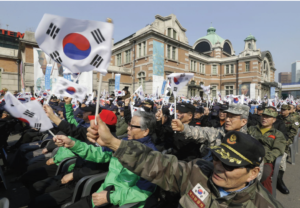In 2010, Yeonpyeong Island of South Korea was bombarded by North Korean artillery. It was the closest the two nations had ever come to reigniting a conflict that had stood still for 57 years — the Korean War.
While these events were happening, I was living in Singapore, and too young to comprehend the weight of such events. The TV was always on, bringing the chaos of the crisis into the calm of my house. My mom watched worriedly when we came back home from school, as she was preparing dinner, as she ate dinner, until we went to bed, and probably after too. Although I got the sense that my mother was agitated, my third grade self was oblivious to the mayhem my nation was embroiled in, merely annoyed that whatever was happening was so important that it foiled my plans to watch Disney Channel after school.
After I moved back to Seoul, my middle school life was punctuated by moments of anxiety. My mom would quietly close the door to her room to have a hushed two-hour long conversation with my aunt. Large quantities of ramen, which we never ate at home, appeared in our pantry. I wasn’t able to connect these small changes in my life with the conferences, the reels of explosions, and the political analysis I saw on TV until I was much older, when I started reading the news, instead of fiction, and when I took on the responsibility of educating myself as a citizen.
For example, this summer, the building tension and anxiety in North Korea finally burst through the TV screen and bled into my life. On July 4, North Korea tested an intercontinental ballistic missile capable of reaching the American continent. On September 3, North Korea carried out a second missile test, which experts estimate was a hydrogen bomb capable of reaching Guam. In the face of all of these events, I questioned various people I met throughout the summer: family members, friends, my doctor, even a random salesperson. Were they worried? Some people expressed doubt in the recent news; they had heard enough loud, baseless threats to dismiss the North Korean leader’s remarks. Others had already accepted their fate, acknowledging their powerlessness in the situation. At least they wouldn’t suffer. At least everything would be over quickly.
For my people, who have lived on the edge of their lives for the past few decades of tension, the choice is between dismissal and denial. Responses of overwhelming worry would have comforted me, because it is natural to be scared of something terrifying and destructive. But my barrage of questions was always met with nonchalant and passive reactions, showing how ingrained and central this facet of South Korean life has become to my people. As I packed to return to boarding school, my mom said simply, “If something happens, you are responsible for your sister. We will make sure you finish school.”
I was simply stunned and heartbroken. Should a nation of people have to accept this as a fact of their lives? Asking this question is apparently a privilege when the adversary is a volatile, unpredictable tyrant with a power complex and nuclear weapons as his toys. All of the people I had talked to had built their lives around instability, and they either had to deny it to continue with their lives, or face it and come to terms with the fact that they and their lives could all be gone in a moment.
This is how complex the conflict between North and South Korea is: an entire nation united precariously around this issue. I could rattle off facts and numbers, but the conversations I had with my fellow citizens of Seoul are far more revealing. Not only this, but Kim Jong Un threatens the entire world, not just South Korea. His newly developed weapons with increased capabilities to cause mass destruction enable him to instigate fights more easily than ever, and nuclear war is a very real possibility.
Despite this, Donald Trump P’00 seems unable to exert self-control. Especially when addressing a leader that has a reputation for disregarding diplomatics and having a hot temper; patience, deliberation, and tact is crucial. What I witnessed this summer was a lack of insight and basic empathy that is essential for handling crises of such heavy consequence; what I saw was a man who wanted to display his power recklessly. At an interview, he said, “North Korea best not make any more threats,” and that “they will be met with fire and fury like the world has never seen.” This is not the rhetoric of a leader who can prioritize the fate of the world above his personal ambitions. Instead, Trump continued his pattern of throwing out rash claims. He, once again, tastelessly spewed his opinion all over his Twitter account, sending an ambiguous warning that he was “locked and loaded.” He reduced the situation into one that could be handled on social media, when the conflict between North Korea and the United States is one that even the most accomplished politicians could not resolve in the past.
What North Korea threatens to do to South Korea, to the United States, is not a personal fight between two world leaders. It is not about who can shout louder in a screaming match. This conflict is not a celebrity spat that can be handled on Twitter. It has grown through drastic policy changes, from the Sunshine Policy to strict international embargos, and varying levels of cooperation between nations. This is one that could set the world alight, one that could show Trump what “fire and fury” really is. I hope that in the future, this conflict will be treated as such, because the alternative is not an option.





